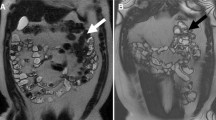Abstract
Purpose
To assess the usefulness of MR colonography (MRC) with a fecal tagging technique and water-based enema in patients with inflammatory bowel disease (IBD).
Materials and methods
Twenty-two patients with suspected or known IBD underwent MRC with a 1.5-T MR system (Siemens Symphony) using a phased-array coil. A fecal tagging technique was performed by oral administration of dense barium sulfate (200 ml) at major meals starting 2 days before the MRI. After a water enema (2000–2500 ml), the MR protocol was carried out, starting with HASTE and true-FISP sequences. Coronal T1w 3D VIBE (2.0 mm thick) was obtained before and 60 s after intravenous administration of Gd chelate. MR images were evaluated by consensus agreement of two observers in terms of image quality and by searching for bowel abnormalities. MRC findings were correlated with our gold standard—conventional colonoscopy (incomplete in 6/22 patients) with histopathological analysis, and surgery (performed in 8/22 subjects).
Results
The MR imaging protocol was completed in all of the investigated subjects. In terms of image quality, 128 out of 132 colon segments (97 %) were considered diagnostic on MR examinations by the two reviewers; signs of bowel inflammation were identified in 74 and 72 % of colon segments of patients with ulcerative colitis (n = 6) and Crohn’s disease (n = 15), respectively. In 13/15 patients with Crohn’s disease, involvement of both the large and small bowel was demonstrated on MR imaging; perianal abscesses and fistulas were also identified in 2 and 3 of these patients, respectively. In one patient with normal MRC, a diagnosis of IBD could not be confirmed.
Conclusion
MRC with a fecal tagging technique and water-based enema is a promising minimally invasive technique for evaluating the bowel in patients with a suspected or established diagnosis of IBD.





Similar content being viewed by others
References
Menees S, Higgins P, Korsnes S, Elta G. Does colonoscopy cause increased ulcerative colitis symptoms? Inflamm Bowel Dis. 2007;13:12–8.
Rimola J, Rodríguez S, García-Bosch O, Ricart E, Pagès M, Pellisé M, et al. Role of 3.0-T MR colonography in the evaluation of inflammatory bowel disease. Radiographics. 2009;29:701–19.
Bechtold ML, Choudhary A. Bowel preparation prior to colonoscopy: a continual search for excellence. World J Gastroenterol. 2013;19:155–7.
Koido S, Ohkusa T, Nakae K, Yokoyama T, Shibuya T, Sakamoto N, et al. Factors associated with incomplete colonoscopy at a Japanese academic hospital. World J Gastroenterol. 2014;20:6961–7.
Achiam MP, Løgager VB, Chabanova E, Eegholm B, Thomsen HS, Rosenberg J. Diagnostic accuracy of MR colonography with fecal tagging. Abdom Imaging. 2009;34:483–90.
Achiam MP, Chabanova E, Løgager VB, Andersen LP, Thomsen HS, Rosenberg J. MR colonography with fecal tagging: barium vs. barium ferumoxsil. Acad Radiol. 2008;15:576–83.
Rodriguez Gomez S, Pagés Llinas M, Castells Garangou A, De Juan Garcia C, Bordas Alsina JM, Rimola Gibert J, et al. Dark-lumen MR colonography with fecal tagging: a comparison of water enema and air methods of colonic distension for detecting colonic neoplasms. Eur Radiol. 2008;18:1396–405.
Lauenstein T, Holtmann G, Schoenfelder D, Bosk S, Ruehm SG, Debatin JF. MR colonography without colonic cleansing: a new strategy to improve patient acceptance. AJR Am J Roentgenol. 2001;177:823–7.
Kuehle CA, Langhorst J, Ladd SC, Zoepf T, Nuefer M, Grabellus F, et al. Magnetic resonance colonography without bowel cleansing: a prospective cross sectional study in a screening population. Gut. 2007;56:1079–85.
Ergen FB, Akata D, Hayran M, Harmanci O, Arslan S, Basaran C, et al. Magnetic resonance colonography for the evaluation of colonic inflammatory bowel disease: correlation with conventional colonoscopy. J Comput Assist Tomogr. 2008;32:848–54.
Florie J, Jensch S, Nievelstein RA, Bartelsman JF, Baak LC, van Gelder RE, et al. MR colonography with limited bowel preparation compared with optical colonoscopy in patients at increased risk for colorectal cancer. Radiology. 2007;243:122–31.
Hartmann D, Bassler B, Schilling D, Adamek HE, Jakobs R, Pfeifer B, et al. Colorectal polyps: detection with dark-lumen MR-colonography versus conventional colonoscopy. Radiology. 2006;238:143–9.
Zijta FM, Bipat S, Stoker J. Magnetic resonance (MR) colonography in the detection of colorectal lesions: a systematic review of prospective studies. Eur Radiol. 2010;20:1031–46.
Lauenstein TC, Goehde SC, Ruehm SG, Holtmann G, Debatin JF. MR colonography with barium-based fecal tagging: initial clinical experience. Radiology. 2002;223:248–54.
Goehde SC, Descher E, Boekstegers A, Lauenstein T, Kühle C, Ruehm SG, et al. Dark lumen MR colonography based on fecal tagging for detection of colorectal masses: accuracy and patient acceptance. Abdom Imaging. 2005;30:576–83.
Ajaj WM, Lauenstein TC, Pelster G, Gerken G, Ruehm SG, Debatin JF, et al. Magnetic resonance colonography for the detection of inflammatory diseases of the large bowel: quantifying the inflammatory activity. Gut. 2005;54:257–63.
Schreyer AG, Rath HC, Kikinis R, Völk M, Schölmerich J, Feuerbach S, et al. Comparison of magnetic resonance imaging colonography with conventional colonoscopy for the assessment of intestinal inflammation in patients with inflammatory bowel disease: a feasibility study. Gut. 2005;54:250–6.
Langhorst J, Kühle CA, Ajaj W, Nüfer M, Barkhausen J, Michalsen A, et al. MR colonography without bowel purgation for the assessment of inflammatory bowel diseases: diagnostic accuracy and patient acceptance. Inflamm Bowel Dis. 2007;13:1001–8.
Acknowledgments
The authors acknowledge Roberto Gigoni, MD and Simonetta Salemi, MD for their valuable contributions to the optimization of the MRI protocol and the evaluation of MR examinations.
Author information
Authors and Affiliations
Corresponding author
Ethics declarations
Conflict of interest
The authors declare that they have no conflict of interest.
Informed consent
Informed consent was obtained from all individual participants included in the study.
Ethical standards
All procedures performed in studies involving human participants were in accordance with the ethical standards of the institutional and/or national research committee and with the 1964 Helsinki Declaration and its later amendments or comparable ethical standards.
About this article
Cite this article
Boraschi, P., Donati, F. MR colonography with a fecal tagging technique and water-based enema for the assessment of inflammatory bowel disease. Jpn J Radiol 34, 585–594 (2016). https://doi.org/10.1007/s11604-016-0552-4
Received:
Accepted:
Published:
Issue Date:
DOI: https://doi.org/10.1007/s11604-016-0552-4




